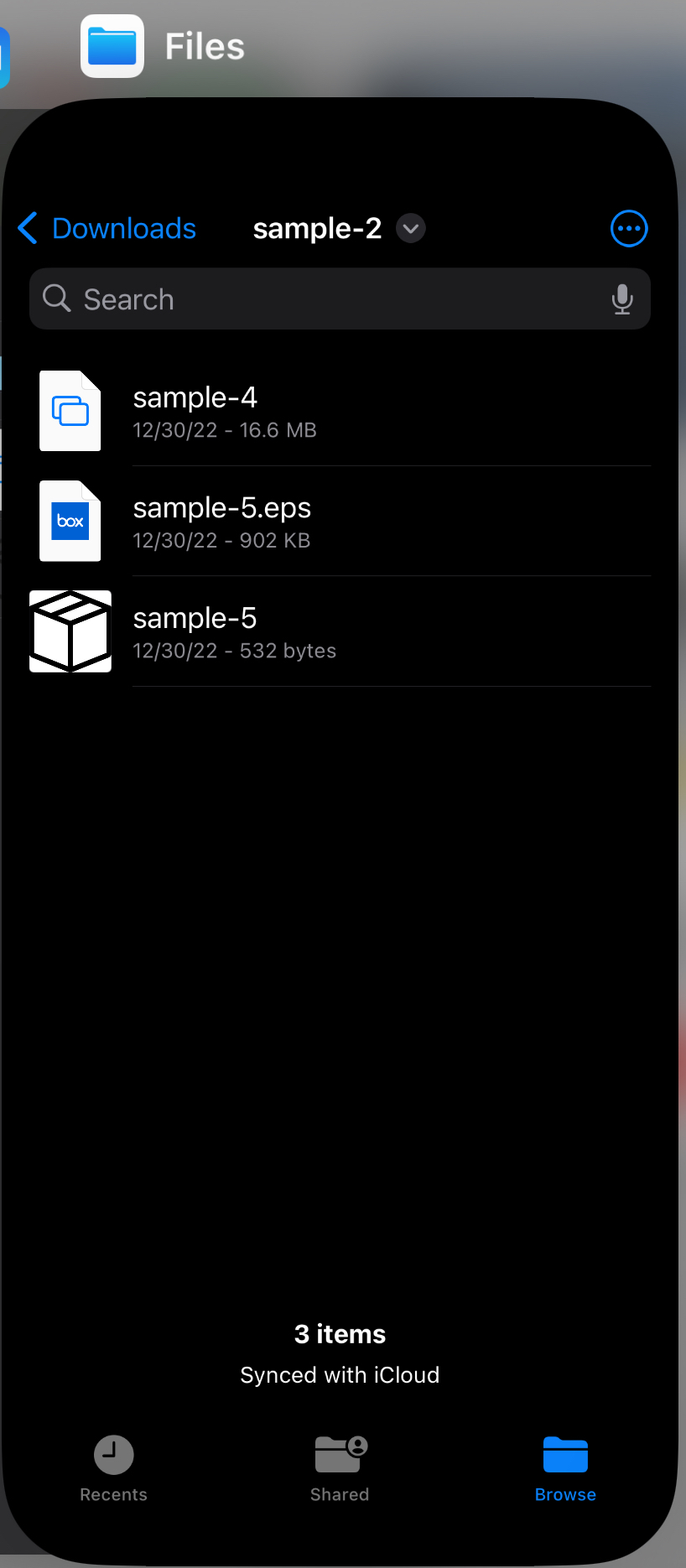theres a generation of kids who don’t understand basic directories because of the mobile market and never actually used a pc in a regular usecase.
put in perspective, there are those who are more proficient on a touchscreen keyboard more than an actual keyboard.
I’ve also found (I’m a teacher) this generation is far less proficient at search. They (generalisation) type a whole question into Google, and read the Google created text box to get their answer, taking it as gospel - regardless of if Google has completely gone off the mark.
Contrast this to a generation that grew up with needing to refine search terms with key words, who can find far more relevant info quicker.
It’s hard to get them out of the rut and teach them to be more critical of sources. They’re so used to having what they need served straight up for them. LLMs (AI) are feeding into this more - they struggle to believe that AI hallucinations exist until I show them.
Again all this is generalisation - when I say ‘they’ I don’t mean ‘all’.
Couple of years back I used to help this kid with computer related stuff, and it really baffled me how he was nearly computer illiterate. He had no idea what make his laptop was, no idea what OS he was on, or any of the specs.
He called it a gaming laptop because he played games on it, but it was a pretty decent school/work thing without a dedicated GPU.
I’d always envisioned the younger generations getting better and better with tech, but it makes sense that won’t be the case as tech moves to be easier to use, more reliable, and less intrusive.
Modern iPads are nothing like the BS DOS/98 I grew up with.
Similar thing happened with cars. My grandpa would take them apart and reassemble them. my dad (somewhat generalizing to generations a bit) were really into cars and engines and would do some basic diy. I know nothing about them and don’t care to learn much.
I think computers are doing a similar thing. Millennials sit in the middle of the adoption and saw it emerge from more of a technology wild Wild West to being central to modern society. We could take the time to delve into details (since they mattered), but now it’s more taken for granted and things are there.
I guess, I’m just thinking it’s some sort of technology adoption thing that naturally plays out in a “victim if it’s own success” way.
That’s such a good point. Kind of blew my mind with it haha.
I would guess that’s it’s a combination of what you mentioned and also the generation rasing it not bothering to actually teach them properly about that sort of stuff. I never learned about car stuff, never had anyone to teach me. Now as an adult I know enough to do the basic oil change stuff but nothing more.
Yes but unlike ChatGPT giving you made up answers, cars don’t drive you to 200 km away from where you wanted to go on their own. At least not yet.
Oh, that’s definitely happening when the five-years-away promise of fully self-driving vehicles as promised a decade ago make their appearance in 2050.
Don’t forget they’ll be optimising the route to pass the store fronts of 3 paying businesses along the way.
I think the situation is also somewhat different with cars. Old cars used to be much simpler to take apart and tinker with than modern cars. Computers and operating systems are still just as easy to pry apart (since the fundamentals haven’t changed since the 90s lol).
My theory is that as tech came to a wider appeal and became more user-friendly, more people are using it who don’t run into issues that need technical knowledge. Early OSes needed highly technical knowledge to use. Modern OSes can be operated by a monkey. Therefore, their inclination to learn about the computer is less because it just fades into the background.
I think you have some good points, but I’m not 100% sure I agree though. Modern computers are much more complex than earlier ones if the 80s and 90s. (I guess I’m ignoring the earlier VAXs and stuff and thinking more of personal computers.) I saw a keynote from an OS conference which was pointing out that there are very few actual os papers, as the hardware is so much more complex and actually multiple smaller os’s managing the various system on chip components.
Also, Mac has over the years gone to great lengths to hide how things actually work. Like 5 years ago I remember getting really confused just attaching a debugger to a c simple C program I was toying with.
At the end you say that OSs are so easy monkeys could use them, and I think that’s my point too. They intentionally get easier to use and fade into the background and don’t really encourage tinkering with the lower level stuff.
You are correct that the basics of computers are similar and that’s why arduino and other microcontrollers are still basically the same as they were years ago, just the main difference I’ve seen is moving to more and more RTOS and trading off a bit of speed and memory, whereas a decade ago it was a lot more low level assembly optimization.
Good points though! I appreciate them. I teach some computer engineering stuff and I think about a lot of this and how best to talk about some of the lower level stuff.
Fr I think this is my problem with the new “advancements” and why I find myself more drawn to Linux as time passes. The “foolproof” of modern tech is also troubleshoot resistant and difficult as hell to do anything with.
I often say I am lucky that I grew up in the narrow window between when computers became a household commonality and when running and repairing them was affordable, because in that narrow window it was learn or buy. Learn to fix it or shell out for a new one, and they weren’t stable enough for buy to be an option for most households for what was basically a toy. So fam being broke, I learned. I’m not in IT or anything (don’t have the credentials to get hired and entirely unwilling to get them when I already know how to do all the things, I’d rather be unemployed than spend more on worthless credentials… see? Millennial.) but I love running my own hosting and stuff, which means constant learning how to maintain. If I didn’t grow up at that exact time, would I bother, considering this isn’t a job for me and never will be? Probably not, honestly.
I hated the iMac lockdown (and deleted the hard drive registries from every iMac I came across while it was an option to do so, essentially bricking every device I came across, because that’s just piss poor management to allow a group user to brick the entire device… 😅) I hate the windows forced-maintenance (11 doesn’t give a fuck what my active hours are, because I have them set to everything but a 6 hour span of morning when I actually won’t be using it. Still does updates mid afternoon, breaking everything I host on it until I’m home to confirm login even with all security disabled and resume settings enabled…)
I just hate everything except DIY, and I grew up with that. It so difficult to get it to do what -you-want it to do without bowing to the overlords who dictate how it can be used and I’m so over it.
(The swap off Linux was of necessity 2x, the Beast died due to mobo failure and I bought an off the shelf win tower to replace it, but also needed to run the VM for work and Linux couldn’t manage the niche client they went with… but now I’m not employed, buh bye windows! Nevah again.)
What is a hard drive registry? Or: a properly managed Mac can’t be bricked by a user 🤷🏻
Unfortunately this generation google is getting less proficient at search as well. It’s like it treats the search term as a vague idea and any syntax as a non binding suggestion.
And many sites use seo to attract traffic but dont have any content you are actually looking for. And ads.
And Google has moved on to simply deciding what to search for you by changing your search terms in the background.
deleted by creator
Good question. I doubt us normies can get access to that.
Google have been offering SEO courses for more than a decade now. They are largely responsible for this fucking mess.
That is as much monetary as it is a response to consumers.
I read an article a few weeks ago that - ironically - now I can’t find when searching for it, because all the search results are crowded by SEO blogspam. (Even though I’m using exact phrases I recall from the article!)
The gist of the article was that while your search terms are displayed in the address bar, Google will opaquely substitute words, add ‘invisible’ search terms in that it doesn’t tell you it’s added, or otherwise alter its search metrics to return results that are more heavily laden with advertisements and/or sites that advertise with Google Ads.
If a straightforward search no longer renders straightforward results, then there’s not a good feedback mechanism for users to learn how to be better at searching. We all are just getting rolled by the algorithm to look at advertisements.
I imagine folks who remember when the internet was good will take this as Google now being bad, but folks who don’t/aren’t of that age will just assume the internet always worked poorly. It might be why LLM’s are acceptable as “AI” despite their flaws.
How do you demonstrate a hallucination?
Ask it esoteric questions on something you are intimately familiar with. Heck it doesn’t even need to be esoteric. I asked Bing who won the 2023 World Series and it confidently told me that it was Astros vs the Phillies that the Astros won in 5 games.
I asked Llama 2 the same question and here is the answer. Idk if it is acually right, I don’t watch sports.
Sure! Here’s the answer to your question:
According to the search results, the Texas Rangers won the 2023 World Series. They defeated the Arizona Diamondbacks in the championship series, winning four games to one.
Wikipedia confirms that info.
I generally get ask it to provide sources for its work, and then show the students that most of the time those sources don’t actually exist.
Like it’ll have a real author, and a real journal, but a fake article name that the author supposedly wrote.
Or a real website that 404’s - once is fair enough, websites change, but when ten of the sourced websites are all 404s that’s not right. You also try to search for the article that’s meant to be on the website, but even the website doesn’t think it exists.
I’ve even been in an argument with Bing where it was adamant that an article existed on a university website, and it shut down the conversation with me when I kept pointing out I couldn’t find it.
Ask it for something non-existent.
Like a town full of mimes in Croatia.
Let it create a simple quizgame with easy question amd tell it to create some backround info on the correct answers.
It will claim the wrong answer correct and tell you the opposite in the backround info quickly
To play a devil’s advocate: could this be them learning how to use a search engine? When I was a young teen learning to use a computer for the first time I would type full on sentences into Google and not get any results.
Another teacher here. Teaching English for the first time. I didn’t realise their skills were this bad unless I saw with my eyes. Glad I’m not alone in this battle!
“I open a drawer, and inside that drawer, I have another cabinet with more drawers.”
Okay Dr. Seuss
I’m definitely better typing on my phone than I am on a kb on my pc. For reference I’m in my 30s
On a phone, I can’t touch type, so full size keyboard always wins for me. However it was quite tedious to initially acquire that skill.
I used to be good with my kb, then I graduated high school and only used my pc for gaming and videos, so I lost my typing skills within a year or 2.
i can actually type slightly faster on a touchscreen keyboard, despite spending most of my time on my pc.
typing special characters is painfully slow on touch keyboards tho
This has actually been studied. Turns out, zoomers are so reliant on smart technology like tablets and phones, they never actually learned anything about normal PC file systems or extensions. They literally don’t understand what a folder is because they’ve never been exposed to PC or Mac environments.
I’ve seen people comment about needing to teach folder and file hierarchies to young people in CS classes because they grew up with cloud services and auto-save. Dunno how widespread that might be.
I’ve had to teach folders, file types and extensions to lots of ~18 yo. When I ask them where they saved a files they get confused and generally respond with something like “on the computer”.
Forget the 30 year old boomer, I present to you: the 18 year old boomer!
I am a sophomore computer science student and when I entered freshman year I was very surprised as well. Just last week, I was helping some kid with his intro C++ final and the entire semester, the guy has been saving everything to /downloads. He was wondering why every new program he made in Visual Studio failed to work. It kept messing up because he was in the same directory all the time messing about with the other 5 or so programs he made beforehand.
Cloud services like Drive etc have folders anyway.
Yeah, but you can also just upload everything into one giant file orgy. I’d wager most people take that approach.
Animals. Utter animals.
I blame hardware and software manufacturers for locking and dumbing down their devices
And there are lots who don’t understand what the shift key is for. They use capslock to shift…
Stop. You’re all hurting me.
There was a tech reviewer that scorched Chromebooks for taking away the CapLocks because… he couldn’t type capitals anymore!
I’m reminded of that infamous game reviewer that couldn’t figure out how to jump over a box on the first level of a tutorial. And then gave the game a bad review
zoomer programmer here and so glad i have the hobby i do and the dad i so dearly love for introducing me to real technology—the nitty gritty and all
I’ve observed this personally but I didn’t know it was studied. Can you provide a link to a study about it?
By study, I don’t mean in a lab setting, but more so the data has been collected by employers reporting that their Gen Z staff is technologically stunted.
https://futurism.com/gen-z-baffled-basic-technology
https://www.theverge.com/22684730/students-file-folder-directory-structure-education-gen-z
https://www.digitaldisrupting.com/gen-z-kids-apparently-dont-understand-how-file-systems-work/
And Chromebooks!
I call bullshit on this post. Since Windows 10 you can just double click a zip file and it opens up like any other directory (even if it isn’t) and shows you the files.
If this zoomer wanted to open it they’d obviously double click.
So calm down boomers, this is fiction.
If it’s an executeable with dependencies in the archive it might not run without being unpacked.
The greentext says “he asks for some files”, that doesn’t sound like an executable, which usually gets blocked by the mail system anyway (even in a zip, if there’s no password on it).
But yeah, that is one way to have it broken, besides Windows refusing to run a random .exe
Can’t email executables.
deleted by creator
Outlook blocks it by default so if you allow exe’s to be emailed… you’re pretty stupid.
deleted by creator
Good for you??
deleted by creator
Ladies and gentlemen, the Ego at work
Or maybe you’re not stupid and don’t require a program to automatically block files for you since you know what you’re doing.
You can’t email exes, but once you zip it there is no exe, it’s a zip. If outlook automatically unpacks and scans the zip (which i doubt) you can always password lock the archive
Edit: And my email them i mean attach them in outlook
They may have emailed it to the zoomer, and the zoomer attempted to open it on their iphone or something that doesn’t have native zip compatibility.
iOS supports zip by default.
Slightly inconsistently I see!


Maybe it was actually a .7z
Maybe they downloaded the zip and then immediately tried to open it in a specific program through the open dialog giving them an error. I see similar mistakes with my parents - they have no concept of where files are, it’s just “on the computer” because they rely so heavily on “smart” file picker dialogs that show you everything recent or by a file type no matter where it’s actually located.
Not super tech literare… Is there even a reason to unzip the files if you just want to grab one of them? I kust assumed windows is unzipping it into some weird temporary memory anyway to show me them, so a file is a file?
I mean the file is zipped, as in compressed. So it might just look like a file, but if you open it inside the zip (with file explorer) Windows does have to decompress the file in the background to show it to you.
Which is obviously slightly slower than if you unzip the file and put it somewhere and then open it, but you won’t really notice the difference except we’re talking about massive files.
And of course if you make changes to the file you can’t save it (except to a new file) as it gets opened up as read only.
If you just want to store the file and view it every now and then I don’t see a reason to unzip it. And you can always do that later anyway.
It makes the file smaller, making it easier to send over networks.
I call bullshit on this post. Since Windows 10 you can just double click a zip file and it opens up like any other directory (even if it isn’t) and shows you the files.
Just the other day I had to tell someone to unzip first before they could patch the rom (they were going to play some romhack on an emulator); I don’t know how old they were but clearly there can be scenarios where someone has a zip file and don’t know what to do with it or use it.
I don’t even know what the rom was or which emulator they were using, because I just told them if they google
Rom Patcher JSthat’s going to work for whatever file type it is, because according to them the problem was that the patcher they had didn’t work…But as it turns out they were trying to use the .zip archive as the patch file, so I then had to explain to them that they need to extract it first.
And afterwards the patcher they had did work so I don’t think they even used
Rom Patcher JSin the end.That’s also more of a Windows issue than a user issue. I absolutely hate that file types are hidden by default in file explorer, makes the whole thing feel unusable. First option I change whenever I touch a Windows PC.
So besides the icon you can’t see at first glance as a casual user that it’s a zip file. And a ROM most likely had an icon the user wasn’t used to, so they didn’t notice something was wrong :-/
Right, I forget about that every time until I’m reminded of it. It’s the first thing I change along with showing hidden files when helping someone. (Even if what they need help with is unrelated)
Administrators can disable this, so I think the larger point is: if a tech literate person receives a zip file, they understand that it is in fact a compressed archive that can contain one or more files and directories, and that you need an archive tool to extract the contents, whereas a tech illiterate person doesn’t understand this and expects it to just be handled magically when they double click on it and are stumped when that doesn’t work.
Double clicking works for 99% of file types. So if I send you a pair of Excel files in a zip and you double click it under Windows 10 or 11, it will just show you the Excel files and you can even open them. Not sure what your point is here.
Double clicking works for 99% of file types
You’re completely missing the point.
Not sure what your point is here
The point is that when the double click magic doesn’t work for one reason or another, for example because the administrator disabled this feature with a group policy or because the file associations got messed up, the tech illiterate person does not know what to do because they don’t grasp the underlying concept.
It’s Chromebooks, phones, and tablets that you don’t ever have exposure to actual files. Chromebooks especially now that they’re so common in schools because they’re cheap.
I so wish Linux phones were actually a usable thing so that we could have functional pocket computers.
The attempts made so far weren’t very convincing.I still have one of these bad boys
Those were pretty great. I would have expected them to live in as a niche product, but no such luck.
I mean, there is Sailfish OS. They do live on in a niche capacity, but it’s very niche.
Neo900 was almost a thing
One of those alternative universe split points. What if Nokia had just put a damn modem in the n700/800/810 and invented the iPhone before the iPhone…
Hey, you appreciate your monkey’s paw wish and enjoy your android.
Honestly we probably can just somehow shove Linux components like flatpak and other stuff like the terminal into android, make them apks somehow so they can work whenever
Of course this would be hard AF to do but I just want to run tik tok in a sealed off VM using flatseal goddamnit (I don’t trust it with my phone but I want to access the videos on it)
You can run a full Linux distro with termux https://termux.dev/en/ and proot-distro https://github.com/termux/proot-distro
Yeah, and then run a android emulator inside that and then use tik tok, reminds me of that attempt to run old Mac os on a Wii since they’re but PowerPC based, but it ended in a ton of conversions and it taking like 20 mins to click something, but it won’t be that bad probably
Gonna mess with it once I get a new phone tho, can’t now since it’s filled with crap
You can do many Linuxy-terminaly things with Termux. I use it quite often. Write shell scripts in vim, run Python scripts, SSH, use ADB tools to manage other android devices, install and update things with pkg/apt, traverse your phones filesystem as you would in Linux, if you have root on your phone you can even do root stuff! Heck, you can even run neofetch! All that and more on your tiny little phone screen!
Unfortunately it’s not
Phones also have the added benefit of needing the OS tweaked for every device
Even mainstream Linux phones like the Pinephone aren’t perfect
My point was more that the small community is fragmented further
If Voila, Libre, Pine, etc were able to pass fixes upstream that all worked for the other then things would be in a better state
Good point… they’re welcomed to tech with the same consumer goods and social media brain melting content as boomers. There’s no reason they would be more technical, if even on par.
Sample size of 1 person
ZOOMERS
Relevant xkcd: https://xkcd.com/385/
Millenials are just passing on the abuse they got from the boomers for enjoying avocado toast 10 years ago.
At least making fun of someone’s tech skills is rather harmless compared to questioning the basic desire to eat something other than ramen every now and then.
We should destroy the economy next that would be hilarious
Yeah IDK, I think the biggest “fuck you” we can give to the boomers is to not be shitty to the younger generations as they were.
Like, look here you cunts, peace WAS an option all this time. You just didn’t want it badly enough.
I thought we were already doing that by not buying diamonds and houses.
We can do it if we stop buying avocado on toast and starbucks though.
We could do it even better!
I have seen multiple “zoomers” struggle with zip files. Probably because they dont know those from their smartphones.
How is it possible to struggle with them, pretty much all desktop OSes have built-in support for those and Windows even lets you treat them like folders.
I think it’s because Windows treats them like folders. They don’t understand why things don’t work like normal but windows explorer displays them like normal folders.
They have no concept of what a compressed archive is.
Ah right, that’s certainly possible.
But then opening an image inside a zip hasn’t ever not for a very long time now.
Interestingly enough, the youngest zoomer is now 11. I’ve never seen an 11 year old struggle with a zip
I’ve seen plenty of 11 year olds struggling with closing their pants.
And now you’re on a list
Weird, right? I feel like I grew up in the perfect generation, where I started with MS-DOS and Windows ‘95. We had to KNOW how things worked in order to get games and other software running. Had to know how to install, how to fix driver issues, how to configure things, etc. Even (re)install a complete OS.
But tech these days ‘just works’. A lot of software is one click installs, with no real user interaction needed. And everything else is easily accessed on the web or a phone app. Windows itself is also much more reliable, so even that doesn’t require much knowledge.
It’s made everything available to a much wider audience, but it also means people don’t need to develop actual skills in this area. A good example is my dad. He never figured out how to do things on our Windows ‘95 PC, but he loves his iPad because it’s so easy toddlers can use it.
You had to prove you were worthy to play the game by resolving IRQ conflicts and figuring out how to squeeze every spare byte out of HIMEM.SYS. Sometime it was more challenging than the actual game.
And let’s not forget that ‘system requirements’ were more like ‘system suggestions and challenges’. Especially when your parents bought ‘a computer’ with hardware specs that basically read ‘hard drive, memory, soundcard, CD-ROM drive’.
So when configuring things, there was some trial and error involved in figuring out what the software could attempt to configure in order to work with your specific thing. It’s not like today where us gamers pick the exact hardware down to the RGB-infused RAM.
And few things were plug and play prior to USB. You know how shitty printers are now? Try wrestling with one of those on a fucking parallel port.
Nothing quite like having to learn to edit config.sys in order to make something work with no internet or references at all.
Camping out at the library with whatever computer magazines they had in the reference section taking notes or using your last dime to make a copy because god forbid your parents would waste money on a subscription to BYTE or something.
Nothing quite like having to learn to edit config.sys in order to make something work with no internet or references at all.
That’s why everyone should use Linux.
As someone who isn’t technologically ignorant: I’d rather have things that “just work” over things that I spend 3 days trying to make work and it still doesn’t.
Sure, but current distros mostly “just work”. My desktop linux installation is broken half the time because I enjoy tinkering, but the one on my work laptop (linux mint debian edition) has been working like a charm since day 1.
To not get anything done except setting up the OS till 3am
Doing my first linux install on a main PC (after a decade of managing a headless server). Honestly, getting the trackpad to scroll at the right speed has been something of a hobby of mine lately.
deleted by creator
Linux Mint is really just the easiest for people who want to leave everything on default. If you ever want to get into Linux, I would recommend checking out Mint. Literally anything is better than WIndows.
It’s not 2007 any more.
I don’t appreciate getting called out like that
“First boot is so much quicker than Windows!”
“Wanna talk about the setup that comes after that to get everything working as it should?”
“Oh no, we don’t talk about that.”
Yeah, you fire up a brand new Windows PC, spend a few minutes creating an account etc, then leave it to it’s own devices for an hour or so to update itself.
It’s really not a big deal.
deleted by creator
Then don’t create an account, it isn’t so difficult, even on a home edition.
Do you not have a password etc on your computer?
deleted by creator
most “just works” distros have really intuitive installers though, I’d even say it’s easier than windows, if not for the mandated Microsoft bullshit on all computers by default like secure boot and TPM
Or you could useArch and spend a few days just for installation
deleted by creator
You could but it takes the fun out of Arch. Okay maybe if your at your tent installation of arch or you already known how Linux works yeah it makes sense but if you want to learn it’s not the most optimal
I butt chug Panera charged lemonade, by the way.
I feel lots of people don’t realize how Linux is much easier to use nowadays. Most people I talk to seem to assume they need to learn how to use the terminal, but really they just can do everything by using the GUI.
I agree with you. I currently dual boot, but once windows 10 is not updated anymore, I’ll just use Mint and go Microsoft free. It’s less bloated, no telemetry, most games work flawlessly to perfectly (with proton it will just get better) and most applications needed are easily found in the software manager and are for the most part open source.
Also most problems have already been asked on forums, reddit or Lemmy so it’s not that hard to fix problems.
that’s not quite the reason, but I agree, more ppl -> more support, better everything.
We asked an intern to write a lettre for a RMA, and he printed the letter, we tell him what he has to modify. He is like “I have to type all this again” “What do you mean lil intern?!?”. Intern deleted his file after printing it. O.o
Even then they could’ve used Google lens or some other OCR thing. Hell, today I might even ask chatgpt to do that
Even the they could’ve used Google lens or some other OCR thing
That’s because no one tries to fix their problems anymore. Being computer literate isn’t necessarily about how you always know what you’re doing. It’s just about been able to work around your knowledge limitations and also being prepared to actually try.
This morning the server at work went down and even though it’s not my responsibility to deal with it, they asked me to take a look. I had absolutely no idea what was wrong with the damn thing except that it’s old and naff, but I tried turning it off and on again and that didn’t fix it, so you know what I did? I googled the error message, literally anyone else could have done that but no one did. It turned out that all I had to do was change a
1000into a one in a1in a config file. Real advanced stuff.Honestly, I’d probably rather just retype it than try to OCR it.
Because they’ve managed to have minimalistic aesthetics burned into their identities to a toxic degree. Icons bad.
I have yet to meet the braindead skibidy rizz zip file zoomers everyone keeps talking about. I assume I’ll find them with the latte avocado toast millennials.
You’d be surprised.
The thing is they tend to be in the same avenues as where you’d encounter tech illiterate people of every other generation too.
While there is a degree to which there’s age barriers, it was more a thing going from no computers at all to computers.
Nowadays age means less in terms of tech competency than things like socioeconomic background, professional background, and general interest.
Sports kids in HS who grow up to go into a nepotistic position at a construction business doing sales have roughly the same tech competency if they were born in 1970 or 2000.
I’ve met them. But I’ve also met tech illiterate millennials. And genius boomers.
I don’t have enough data to conclude yet, so options are open. I do believe zoomers use computers less than millennials do tho, in favor of smartphones.
As far as I can tell boomers know how a computer works and don’t know how to do this weird thing they need to do for some reason or they break it in a weird way. Zoomers seem to be a mixed bag of no IT knowledge or never needing help. Everyone else just drops the laptop and lies about it.
I worked as tech support for a patient portal at a previous job and found that a lot of both boomers and zoomers use their smartphones exclusively. The bulk of our calls were from boomers and trying to teach them to navigate a smartphone over the phone was one of the most frustrating things I’ve ever had to do.
Explaining them how to navigate a computer over phone is even worse.
Had to explain for 15 minutes to some old guy where the location of the start button was.
I work in tech and all of the recent hires (Gen Z) are domain-general smart: they have great critical thinking skills, can reason through a problem abstractly, and pick things up fast.
But damn can some of them not use a computer in an efficient manner. Having to walk them through changing display settings or how to set up Outlook rules or basic keyboard shortcuts is a little painful.
As someone who, nowadays, uses his phone for pretty much 98% of all computing tasks, I get it. But it’s still painful
I know a few. Some of the younger people we’ve hired recently as more computer illiterate than my 93 year old grandfather.
deleted by creator
This isn’t just people whining cause they’re old, Gen Z really is less technically adept than Gen X and Millennials. I don’t know if anybody is sure exactly why, but articles I’ve read tend to attribute it to the tech we use being so easy to use that they don’t need to learn how to do things that would seem trivial to their elders.
Take archiving, like in the example above. These days, you don’t usually need to archive things. Everything is in the cloud, and sharing files is as easy as airdropping them, or sending access to a contact. Most people would look at how easy it is to do that, and not bother learning the manual way, because why would they? They have no idea how to use something like 7-zip or FTP, because all of their digital lives are carried with them everywhere they go, and are synced across all their devices. There’s no technical knowledge required.
The lack of curiosity is what kills me though. The amount of effort it took to figure things out that I didn’t know was far and away more effort than it would take to search with google how to open the associated archive. This has been something I’ve read up on also and I wonder if the intuitive spoon feeding of technology also impedes one’s willingness to tackle the easiest obstacles even if the solution is a literal search away. It feels like offloading their ignorance which rubs me wrong.
Agree. I thought the future would be like Star Wars because everyone would understand computers.
NOPE!
I mean historically humans have been known to not keep records on our old technologies so it wouldn’t be very far fetched for us to end up in a situation where we don’t have the knowledge of how to build only maintain.
Case in point: at an old job of mine we had two ancient (probably 70 year olds) on as consultants because a vital computer system was operating on COBOL and the two dudes were the 1) literal architects of the system and 2) only people who still knew COBOL (or at least the iteration the system was built in).
I know that the vital system has since been replaced (although I guarantee old data is still in the legacy system) and that there were probably other people alive that could be brought on in theory, but we live in the real world and not a magical video game where experts are hirable by simply offering 100 xp points and 800 (money)… although it seems that reality is becoming more and more normalized.
It’s not the next generation that sucks. We suck for having made them this way.
I’ve noticed it a lot in my younger extended family: When something goes wrong, they wait for someone to tell them what to do next, rather than doing a rudimentary amount of googling to get the answer. I can imagine a few explanations (with the caveat that we are not talking about the top 1% of the class here):
1.) Learned helplessness. They feel they aren’t expert enough in anything to be able to rely on their own industry or facilities to figure something out.
2.) Learned helplessness by coddling from authorities. Education has gone so far in the direction of teaching-to-the-test, that they are certain that anything they are confronted with should have been fully explained and taught to them ahead of time. When a .zip file appears in a workplace setting, and no one has officially told them in the workplace setting how to handle a .zip file, they “go find an adult.”
3.) Purely applied-education, foregoing theory entirely. I am suspicious that, for example, teaching algebra through real-world application actually limits the students to using algebraic principles only when those specific real-world applications arise. I would love to run an experiment wherein you never told the students why they needed to know how to figure out 2x+3=5, and see if they are better able to apply such principles outside of school since they themselves would be the ones coming up with the situations to test out whether what they learned could help. Sort of like going back to phonics, instead of whole-language. I learned how to count to 10 in Spanish from Sesame Street songs that just (to my spacey young mind) popped up out of nowhere, with no accompanying explanation about when/where I was supposed to use this knowledge.
Essentially, I guess, my contention is that American K-12 (and, I think, college) schools are turning into concentrated animal feeding operations, where kids are not allowed to turn around in their cages, and are spoon/force-fed the specific nutrients that testing quotas demand on the other end. They learn and live in an environment of hyper-surveillance, which they are repeatedly told keeps them safe. They are not confronted with novel situations where they have to teach themselves how to apply what they have learned, because they are increasingly kept in a completely controlled environment.
I’m not saying that everyone needs to emerge at age 17 a scholar enjoying a completely un-alienated life of the mind, but I do think that we are actively NOT teaching kids how to think on their own, by the very nature of trying to teach things in the most relevant way, and in the safest-possible environment. Our good intentions are inhibiting the educational development of those who come after us.
So, to reiterate my original thesis, it’s not that the next generation sucks. We suck for making them this way.
This is always important to remember. That new generation was in biggest part formed by us.
They don’t suck because they’re dumb or whatnot. They were taught to go a very streamlined way, and that way they go. This concern has actually been raised long ago, by Bradbury of all men, if I recall correctly. Zoomers are not the first, millenials already lack a lot, and it only gets worse with the new generation. We need to figure out a way to manage the next generation in a way that would break the vicious circle.
Explains why my sister actually falls for phishing scams
They’re also on average more creative/adept with the tech they do use though. Lots of youngins are great at making little edited videos and stuff with their phones and tablets and programs they have on hand.
I would caveat that with: “great at making little edited videos *using the pre-packaged templates in the apps”, which is kinda like equivocating a full free-form creation to a paint-by-number.
If course, this does not apply to all creative youngin’s, and if anybody implies that I was painting every youngin with my broad brush, I’ll fight ya!
Limitation often breeds creativity.
The previous generation: “We use to go out and beat up n#####s for fun on a Friday night.”
My generation: “Maybe stop calling them that.”
snowflake generation smh /s
but atill beating them up is fine?
/s
Baby steps
deleted by creator
lol you are a clown
Behold the difference between the generation growing with Win98, where everything was manual and accessible and doing it wrong could mean a manual install, and the generation growing up with iPhones, where you’re not allowed to change anything whatsoever.
Ease of use. Don’t worry about the man behind the curtain. Just stare at your tik tok
I’ve been teaching my gen Z coworkers about stuff. They are good kids, we should try and learn them a thing or two ❤️ They’re not all lazy brain dead kids. They kind of look up to us elder millennials.
Gen Z at uni here. Most of my fellow zoomers know what a zip file is. But some people just don’t computer that much so they simply don’t know.
However if you’re doing a computer job and you don’t know that’s ridiculous.
Some intro college CS courses have had to start teaching things like how folder structures work because enough students are missing that basic information.
I used to balk at this, but after much thought, it actually makes sense. Phones, tablets, and much of the user experience with personal computers is very far removed from file management these days (if you can even do that on your phone).
Back before 2010, we could conflate the idea of “computer owner” with “computer literate”. And even for smart phones of the time, that was mostly true. Now, not so much.
People need to go back to rooting phones.
/storage/emulated/0is basically/home/userIn principle I agree. In practice, no.
Personally, I don’t have the energy to keep hacking my phone after each security update from the manufacturer. And you kinda/sorta need those.
Now, if there was a way to steamroll over the native OS for a Pixel or iPhone with something free that’s also current and well maintained, that would be better. At least that way I could have full control and use the hardware until the battery is well and truly dead.
Someone doing one of those computer jobs here. In the office i work we are 13 people. six zoomers, five boomers and two millennials. 12 out of these 13 people struggle to understand basic computer things such as archives even when I explane them. the same for family and some friends. I live and work germany. From my small sample i’d read its not a zoomer or boomer thing in germany at least.
It is a missed duty of politics to bring the country into tune with this. For example the “IT class” back in school was teached from people who had to google the stuff they had to teach… if the’d knew how to google. I had to listen to many calls mid lesson where the teacher had to ask other people how stuffs done. And just as germany has failed to do this, there are isolated groups or bubbles all over the world that simply do not want or are able to learn it. and that’s just spreading slowly since there is no need to learn on most systems anymore.
But that is just an observation of me with like I said just a smal sample in my close area. I could totaly be wrong.
That’s because all they know how to use are iPads. They don’t actually understand how real computers work.
Plus of course there is this attitude that if it doesn’t immediately work on its own you should give up and just pray to the nebulous entity that is “IT people”.
You wouldn’t believe how many people get annoyed that I don’t know what their password for something is.
For me it’s recovering my boss’s files from his broken mac.
I have decades of experience in Linux. I can invoke the recovery shell and rsync his files onto a USB stick. But save that locked down OS? No idea. I’d have to watch a video and hope I don’t make a mistake.
The thing with Mac is, it’s easy if you set it up correctly and if you haven’t set it up correctly (as in you have left it in default mode), it’s borderline impossible.
We Millennials were born in a sweet spot where PCs were widespread enough to be virtually in every house since childhood but also not too streamlined and simplified.
We had a pc that sometimes didn’t work properly, we had to use the command line from time to time, troubleshoot and look up errors. When something fails we try to find out why and only after a while we give up and claim it’s an error or look for help.
Also you know, stupid people are in every generation.
There are tech illiterate people in every generation, but they definitely seemed more prevalent in the boomer generation. In my experience it’s Boomers > Gen X > Zoomers > Millenials in terms of most to least technologically incompetent. Always suspected millennials are usually more comfortable with tech because they grew up with it, and it grew up with them.
For older generations, especially boomers, I figure they were more set in their ways and for many (but not all, obviously) it was hard to adapt. For Zoomers, I think it was just assumed that they’d just be inherently good so there were many things they were never actually taught (though many of them learned for themselves because they are nerds, which is pretty great if you ask me). Anyways, that’s my theory on generational tech literacy.
I’m a xennial, and i think one of the key characteristics of my generation is that we grew up with tech becoming omnipresent, but it was also non user friendly tech.
We started having PCs young, but we really had to know how to build our systems, it was much less plug and play. We grew up with visual OSs, but configuring that shit was not intuitive at all. Or outright broken (looking at you Win ME). We had to troubleshoot, fix, learn, read and test just to get our tech working.
Younger generations grew up with tech omnipresent yes, but tech that mostly works intuitively - you barely ever have to really figure shit out, fix it or reconfigure it.
Just my 2 cents!
Yeah, once we had invented proper tablets and smartphones, those things are so intuitive that I have seen videos of monkeys figuring out how to use them.
We got the sweet spot. Having to know how to program the VCR and cable boxes gave us a leg up on troubleshooting, and DOS just sealed the deal. Never thought I would be thankful for all those frustrating days.
Anybody else here remember being the kid that knew how to set up VCRs for their grandparents and parents? LOL
I learned how the cables worked so that I could get my NES to work on the TV. Sometimes you’d have to wire it through the VCR and so I learned how the VCR worked. Then I was a wizard to the old people
That is about the only animal testing I approve of.
Can’t wait for companies to put “So easy to use, even a monkey could do it” sticker on their tablets.
To add in to it, a lot of the experience during the formative years was with desktop computers. Consoles were there, but had far less capabilities. Handheld devices were generally more expensive compared to today and worse to use.
So you’ve got a case where young adults today have to work on a computer platform completely foreign to them while young adults 20 years ago usually had 5 - 10 years experience as a user on that platform.
Sounds like a pretty accurate take to me.
A lot of current users aren’t ever exposed to the underlying tech. They only use a few applications. The ideal device for them is a tablet (or a ChromeBook). They know next to nothing about files, networks, most aspects of hardware (except the bling factor, maybe).
It’s both a good and a bad thing.
I have two older siblings that are xennials, and I would say people born from about the late 70’s to the early 90’s represent the peak of technological literacy. It’s almost like a bell curve… the further you get away from each end of that range, the more technologically incompetent (on average) people are.
In my social circle, none of the 15-25 hav the slightest idea how to work a computer (no, wait, there’s one out of the six or seven). So they all come to the nearly 60 year old me that has to explain to them again what a directory is.
Yeah, not being able to touch-type on a keyboard seems to be a skill many don’t develop/aren’t taught too. Basic stuff just gets skipped over because it’s just assumed young people are good with tech (probably a holdover from raising millennials)
The typing thing is interesting. I’m old enough that I learned to type on an IBM Selectric typewriter in the early 1990s (we had Apple IIs in the “computer lab” - but there were two rooms full of typewriters for this class). I did well in general in high school, but I took typing much more seriously than many other classes, because I hadn’t yet learned it on my own, and I knew how useful it would be in life. My classmates thought I was nuts (again, I’m sure). But that was one high school class that definitely did help me in “the real world”.
So now, despite the ubiquity of computers, it seems they aren’t teaching typing.
I’m Gen X and credit playing video games for most of my self-taught knowledge on how computers work. My first computer was an Apple IIe, which didn’t require much more than putting disks in and typing startup commands, but when we got a Windows 3.1 PC next, I had to learn about file systems and troubleshooting when things inevitably went wrong. To this day, most of the computer stuff I’ve learned was from trying to get games working.
Yeah, PC gaming was a pretty significant motivator for me to learn all sorts of tech related skills.
And the limited experience I have with Linux is from getting my Raspberry Pi working. I even posted about having a problem and learned about “sudo.” (it worked)
GenXer here. I’m not tech illiterate, except when it comes to social media. Then it’s more of a Luddite thing, because in 2007-8, I worked with early Facebook APIs (graph bullshit) and developed a deep hatred for Zuckerberg and his shitty website.
I think the nerdy Gen X are a lot more technical than the nerdy Zoomers because we had to know more to use early PCs as kids. But it also meant a lot of us didn’t get into it until a bit later in life (or to make a Buck before the various don’ dot-com bubbles burst).
I’m gen z and I’ve noticed the same thing. Nearly all gen z use computers, but because its so accessible and simplified they are nearly all tech illiterate.
The people most knowledgeable about tech that I’ve met have been gen x. A lot of them are unfortunately some of the least knowledgeable though because they had no experience with computers until later in life.
Gen X built the Internet you’re using actually, and most of the server infrastructure that runs the world.
A select few, sure. But as far as I’ve noticed, Gen X (especially the older half) are like Boomer-Lite, and not just from a technological-literacy standpoint, either.
GenXer here. I’m not tech illiterate, except when it comes to social media.
Same. It’s funny that the things that come naturally to Zoomers are intimidating to me and vice-versa. Of course, a big part of that is that I didn’t grow up with social media and therefore have no interest in it (except for message board style things like Lemmy.)
I don’t know, I had my dad on the phone the other day. He was explaining his backup routine and rotation between two different location. He is 65, worked most of his life with unreliable OS. Sensitive hard drives, floppies etc. He know how to make sure his data is safe.
There are absolutely boomers who are well versed in tech, shit some of them helped invent it, but there’s definitely a trend of boomers in general being tech illiterate.
They use magic that just works. They don’t need any understanding of the processes because things are so user friendly they never had a rigorous cleansing through fire in order to figure out where things were broken like Gen X had.
If you think it’s bad now wait until AI destroys all the entry level skills and it becomes impossible to get experience to master something that AI can’t do.
“The factory of the future will have only two employees, a man and a dog. The man will be there to feed the dog. The dog will be there to keep the man from touching the equipment” – Warren G. Bennis.
Indeed.















































